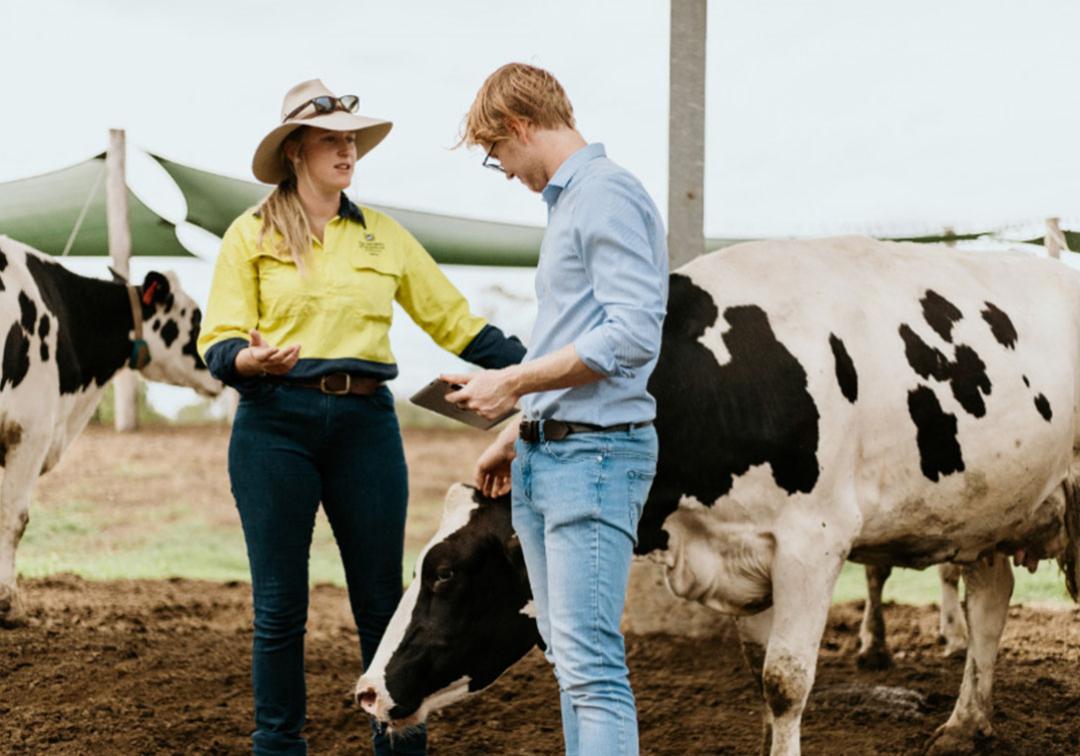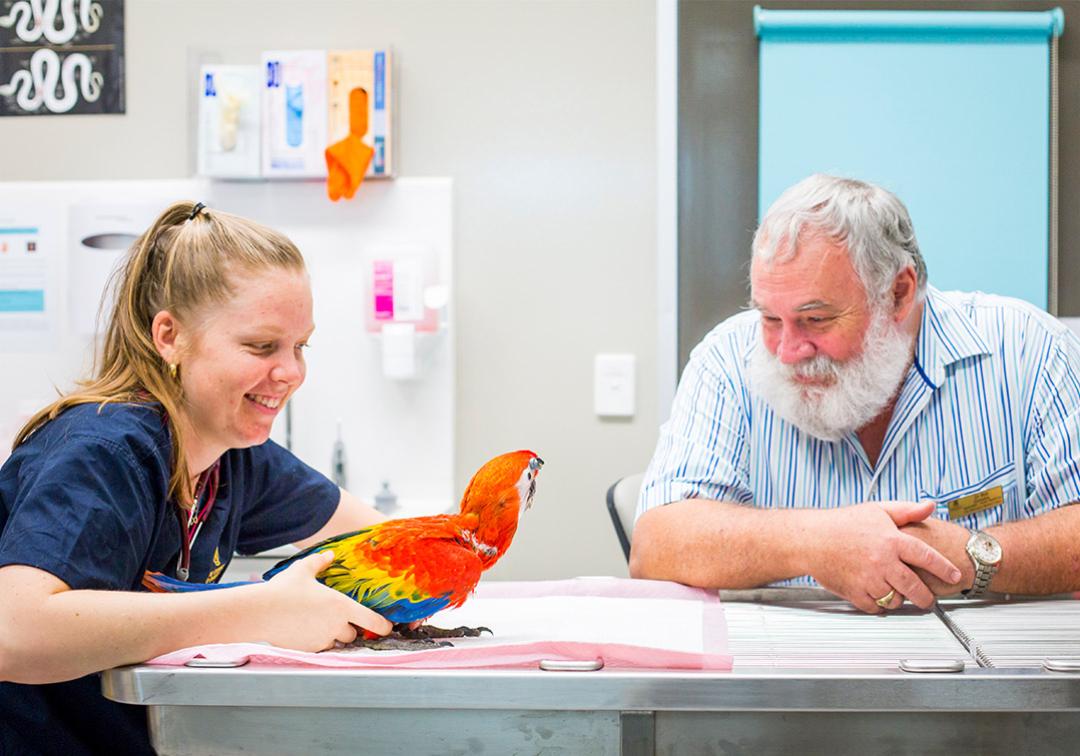
Bachelor of Wildlife Science
Overview
Explore your love of wildlife as you gain expertise in animal biology, conservation and management.
In this program, you'll study native and exotic amphibians, reptiles, birds and mammals, biodiversity and human-wildlife interactions.
You'll be taught by leading wildlife scientists and biologists, and gain the skills to create and evaluate wildlife management programs for captive and wild animals.
Through our industry placements, you'll have the opportunity to gain hands-on experience in zoos, sanctuaries, government agencies, welfare organisations and wildlife parks. You can also go on a short international experience to study wildlife management overseas.
Study with us and you'll graduate with the knowledge and experience to explore a wide range of employment opportunities in research, wildlife management and conservation.
Program highlights
- Gain hands-on experience in some of the best specialist animal research and veterinary facilities in the Southern Hemisphere.
- Get involved in the conservation and management of wild and captive animals in Australia and overseas.
- Participate in industry placements in zoos, sanctuaries, government agencies, welfare organisations and wildlife parks.
How you'll learn
Your learning experiences are designed to best suit the learning outcomes of the courses you choose.
- Lectures
- Tutorials
- Work placements
- Overseas study
- Research experience
- Laboratory work
- Fieldwork
- Workshops
What you'll study
At UQ, degrees are called 'programs' and subjects are called 'courses'. Here's a sample of the courses you could study in this program:
- Animal Behaviour, Handling and Wellbeing
- Biology of Australian Marsupials and Monotremes
- Elements of Ecology
- The Management and Husbandry of Zoo Animals
Dual programs
Double your skills and your opportunities with a dual degree. You can study the Bachelor of Wildlife Science as a part of these dual programs:
Career possibilities
Our programs prepare you for your first job and beyond. Here are some of the careers you could be on your way to:
- Biologist
- Wildlife scientist
- Ecotourism guide
- Conservation officer
- Land manager
- Wildlife officer
- Ranger
- Environmental assessment officer
- Aquarist
Graduate salary
Science and mathematics (undergraduate)
compared.edu.au
Graduate salary
Agriculture & environmental studies (undergraduate)
compared.edu.au
Next steps after graduation
You'll find a diverse range of career opportunities in fields or organisations such as:
- ecotourism
- land management
- environmental management
- research
- vertebrae pest and game management
- government departments or agencies
- wildlife sanctuaries and zoos.
You can also choose to pursue a research career by undertaking a research honours year, which could lead to postgraduate studies.
Events
See all events
8 May
Discover Postgraduate Agricultural and Animal Science
Stories
See all stories
Uni life
What’s it like to study agriculture, environment and sustainability as a postgraduate?
Stories
See all stories
Uni life
What’s it like to study agriculture, environment and sustainability as a postgraduate?
Entry requirements
Prerequisites
- General English subject (Units 3 & 4, C)
- General Mathematics or Mathematical Methods (Units 3 & 4, C).
Prerequisites
- General English subject (Units 3 & 4, C)
- General Mathematics or Mathematical Methods (Units 3 & 4, C).
Entry score threshold
| ATAR / Rank | IB |
|---|---|
| 73 | 25.75 |
These are the lowest adjusted scores we made an offer to in Semester 1, 2024. Entry scores are based on the most recent Semester 1 intake and are updated in April each year. Meeting the entry score threshold doesn't guarantee admission.
Guarantee your place at UQ: If you meet our guaranteed minimum ATAR you could secure an offer for your preferred program.
English language requirements
IELTS overall 6.5; reading 6; writing 6; speaking 6; listening 6. For other English Language Proficiency Tests and Scores approved for UQ
TOEFL iBT (including Paper Edition) - Overall 87, listening 19, reading 19, writing 21 and speaking 19.
PTE Academic - Overall Score of 64 and 60 in all sub bands.
BE - A minimum overall grade of 4 plus a minimum grade of C in all macro skills.
CES - Overall 176 and 169 in all sub bands.
OET is not accepted.
There are other ways to meet the English language requirements. For some programs, additional conditions apply.
Student visas
International students who are accepted into full-time study in the Bachelor of Wildlife Science are eligible to apply for an Australian student visa (subclass 500).
There are a number of requirements you must satisfy before a visa is granted, including the Genuine Student (GS) requirement.
Entry score range
This table shows the range of entry scores for recent secondary students offered a place in the B Wildlife Science for Semester 1, 2024
| Without adjustments | With adjustments | |
|---|---|---|
| Highest | 93.35 | 94.1 |
| Median | 82.35 | 82.35 |
| Lowest | 72.75 | 73.6 |
Need help meeting the entry requirements?
Additional application information
Additional application information
Fees and Scholarships
Indicative annual fee
Approximate yearly cost of tuition (16 units). Your fees will vary according to your selected courses and study load. Fees are reviewed each year and may increase.
$5,437
2024
$5,437
2024
Approximate yearly cost of tuition (16 units). Your fees will vary according to your study load. Fees are reviewed each year and may increase.
AUD $48,160
2024
AUD $48,160
2024
Additional costs
- This program includes one or more compulsory field trip courses that may incur additional costs. Please check the course descriptions for more information.
Government assistance
Financial aid
As an international student, you might be eligible for financial aid – either from your home country, or from the Australian Government.
HECS-HELP
Domestic places in the Bachelor of Wildlife Science are Commonwealth Supported. This means the cost of your education is shared between you and the Australian Government.
Instead of tuition fees, Commonwealth Supported students pay what are called student contribution amounts.
HECS-HELP is an Australian Government loan scheme to assist eligible students with the cost of their student contribution amounts.
Centrelink support
The Australian Government offers a number of income-support payments to eligible Australian university students.
Scholarships
You may be eligible for more than 100 scholarships, including:
How to apply
Applying online
If your senior schooling is from outside Australia, you can submit your application to UQ. Or, if you prefer, you can use an approved UQ agent in your country.
The program code for the Bachelor of Wildlife Science is 2388.
Find out more about applying for undergraduate study
If your senior schooling is from Australia
Submit your application to the Queensland Tertiary Admissions Centre if you're an international student who is currently studying:
- Australian Year 12 (in Australia or another country), or
- the International Baccalaureate in Australia.
The QTAC code for the Bachelor of Wildlife Science is 787209.
Applying through QTAC
All domestic applications should be submitted to the Queensland Tertiary Admissions Centre (QTAC).
The QTAC code for the Bachelor of Wildlife Science is 787209.
Important dates
If you’re studying Year 12 in Australia, go to the QTAC website to check the closing date for this program.
If you’re applying to UQ, the closing date for this program is:
- To commence study in semester 1 - November 30 of the previous year.
To learn more about UQ dates, including semester start dates, view the Academic Calendar.
Important dates
To check the closing date for this program, go to the QTAC website.
To learn more about UQ dates, including semester start dates, view the Academic Calendar.
Admissions schemes
Applying to university can be both exciting and daunting, which is why we’ve tried to make the process as simple as we can.
We have several schemes in place to improve your chances of getting a place at UQ.
Pathway options
A rank or score doesn’t determine your potential.
If you're not offered a place in your first-choice program – or if you don't meet the entry requirements – you still have a number of options.
Aboriginal and Torres Strait Islander applicants
For support with applying – or if you have any questions about university life – get in touch with our Aboriginal and Torres Strait Islander Studies Unit.
Explore other programs
Express yourself. And your interest.
They say choosing a degree is hard, which is why we've made it easy. Register your interest and we'll send you everything you need to know about applying to UQ.







